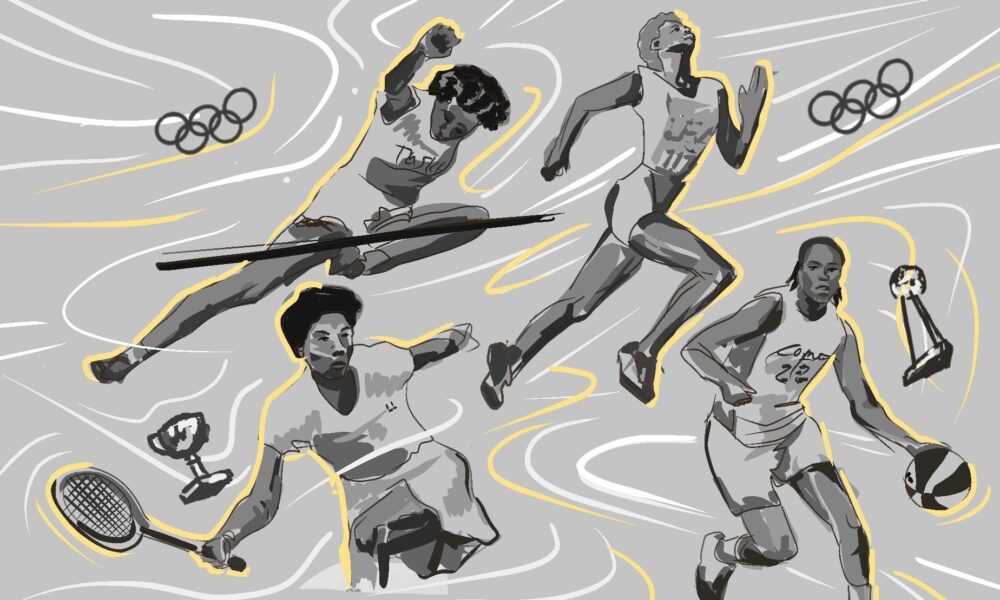Despite significant contributions to the sporting world, Black athletes have often been held back by discriminatory regulations that kept them from participating in the world’s prestigious sports competitions. Today, there are many Black women athletes recognized as the best in the world—Serena Williams, Simone Biles, and Sydney McLaughlin-Levrone, to name a few. These American women have made astounding strides in both racial and gender equity, but their triumphs may not have been possible without the Black women athletes that preceded them.
Alice Coachman, Wilma Rudolph, Sheryl Swoopes, and Althea Gibson are just four of the many Black women athletes who paved the way for athletic excellence, but who history has neglected.
Alice Coachman, born in Georgia, USA, in 1923, made sports history despite navigating both sexism and racism in her youth. As a woman, she was discouraged from playing sports because of societal notions that it was unladylike. As a Black woman, she was banned from training in white facilities. Instead, she ran barefoot on roads and created makeshift bars to practice the high jump.
Her tireless work paid off, and as a collegiate athlete, she won the American national title for high jump for nine consecutive years (1939-1948). However, her most impressive feat was at Wembley Stadium in 1948, where she flew 5 feet 6 ⅛ inches, breaking the Olympic high jump record. When the medal was placed around her neck, Alice Coachman became the first Black woman to win an Olympic gold medal.
Wilma Rudolph, “the fastest woman in the world,” was born in Tennessee in 1940. Childhood bouts of pneumonia, polio, and scarlet fever left her with a leg brace and a diagnosis that she would never walk. However, with her family’s support, she proved this wrong and became an elite sprinter.
At the age of 16, Rudolph attended the 1956 Olympics, where she won bronze in the 4×100 relay. At the 1960 Olympics, she made history by becoming the first American woman to win three gold medals in a single Olympic Games. She returned from this victory to a racially-segregated banquet planned in her honour. When she refused to attend, her activism forced organizers to adjust, and her banquet became the first integrated public event in Clarksville, Tennessee.
Sheryl Swoopes, born in 1971 in Texas, was the first-ever player to sign with the Women’s National Basketball Association (WNBA). Swoopes led the Houston Comets to four consecutive WNBA Championships (1997-2000). She is recognized for her offensive and defensive prowess and was the first player, NBA or WNBA, to win three Most Valuable Player awards and three Defensive Player of the Year awards. Additionally, Swoopes played for the USA Women’s National Team, with whom she won three Olympic Gold Medals. On Oct. 26, 2005, Sheryl Swoopes came out as gay, becoming the first high-profile African American basketball player to publicly do so. She was a trailblazer not only for women in sports but for the Black and 2SLGBTQIA+ communities.
Althea Gibson, born in South Carolina in 1927, was a pioneer for Black women in not one, but two sports. She started with paddle tennis, winning New York City’s Women’s Paddle Tennis Championship at just 12 years old. She then dominated the American Tennis Association (ATA)—the oldest African American sports organization in the world—winning 10 consecutive national titles (1947-1957).
Despite her talent, racism kept her out of mainstream tennis until 1950, when players Alice Marble and Sarah Palfrey lobbied for her inclusion. That year, she became the first Black athlete to compete in the US National Championship and later at Wimbledon. 1957 was the year of Althea Gibson, as she won both the singles and doubles Wimbledon trophies, and secured gold at the U.S. Nationals. She went on to repeat these titles in 1958. She retired from amateur tennis and quickly made history again as the first Black woman to play in the Ladies Professional Golf Association (LPGA).
It is crucial to recognize Black women athletes for their groundbreaking achievements, as racism has long silenced their contributions to sports history. Bringing the stories of American athletes Alice Coachman, Wilma Rudolph, Sheryl Swoopes, and Althea Gibson to light celebrates their triumphs, secures their rightful place in the narrative of athletic excellence, and ensures that their legacies inspire future generations of athletes.








